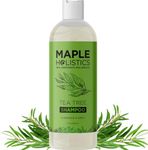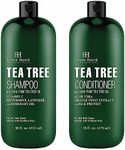Buying Guide for the Best Tea Tree Shampoos
Choosing the right tea tree shampoo can make a big difference in your hair and scalp health. Tea tree oil is known for its natural antibacterial and antifungal properties, making these shampoos popular for people dealing with dandruff, itchy scalp, or simply looking for a refreshing cleanse. When shopping for a tea tree shampoo, it's important to look beyond the label and understand the key features that will best suit your hair type and scalp needs. By focusing on a few important specifications, you can find a product that delivers the results you want without unnecessary additives.Tea Tree Oil ConcentrationTea tree oil concentration refers to how much actual tea tree oil is present in the shampoo. This is important because a higher concentration can provide stronger antibacterial and antifungal effects, which may be helpful for those with dandruff or scalp irritation. However, too much tea tree oil can sometimes be harsh, especially for sensitive skin. Shampoos with a low concentration (less than 1%) are generally mild and suitable for daily use or sensitive scalps. Medium concentrations (1-3%) offer a balance of effectiveness and gentleness, making them good for most people. High concentrations (above 3%) are best for targeted treatment of scalp issues but should be used with caution. To pick the right one, consider your scalp sensitivity and whether you need a gentle cleanse or a more intensive treatment.
Sulfate ContentSulfates are cleansing agents that create lather in shampoos, but they can also strip natural oils from your hair and scalp. This is important because people with dry or sensitive scalps may find sulfates irritating, while those with oily hair might appreciate the deep clean they provide. Sulfate-free shampoos are gentler and better for color-treated or dry hair, while shampoos with sulfates can be more effective for removing heavy buildup. Think about your hair type and how often you wash your hair to decide if you need a sulfate-free formula or not.
Additional IngredientsMany tea tree shampoos include other ingredients like peppermint, lavender, or aloe vera, which can enhance the shampoo’s benefits. This matters because these extras can provide added soothing, moisturizing, or refreshing effects. Shampoos with added moisturizers are good for dry or curly hair, while those with extra botanical oils can boost scalp health. If you have allergies or sensitivities, check for potential irritants. Choose a shampoo with additional ingredients that match your specific hair and scalp needs.
FragranceFragrance in tea tree shampoos can come from natural essential oils or synthetic perfumes. This is important because some people are sensitive to strong scents, while others enjoy a refreshing aroma. Unscented or lightly scented shampoos are best for those with sensitivities or who prefer a neutral smell. Strongly scented options can provide a more invigorating shower experience. Consider your personal preference and any sensitivities when choosing the fragrance level.
Intended Use (Daily vs. Treatment)Some tea tree shampoos are designed for everyday use, while others are meant for occasional treatment of scalp issues. This matters because daily shampoos are usually milder and less likely to cause dryness, while treatment shampoos may have stronger formulas to address dandruff or itchiness. If you want a shampoo for regular cleansing, look for one labeled as suitable for daily use. If you need to target a specific scalp problem, a treatment formula used once or twice a week may be more effective. Match the shampoo’s intended use to your hair care routine and scalp needs.
















